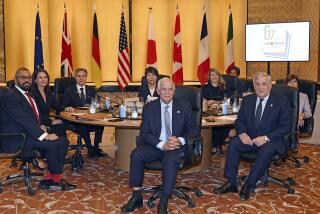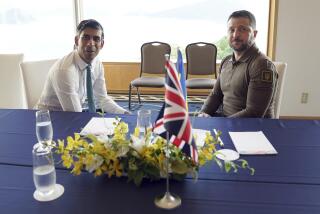Finance Officials Voice Their Anxiety About Oil
- Share via
NEW YORK — Finance ministers from the Group of 7 industrial countries on Sunday urged the world’s largest petroleum producers to pump more oil to reduce risks to global growth, British finance minister Gordon Brown said.
“We welcome the move by some oil producers to raise production targets and call on all producers to take action to ensure that world oil prices return to a level that is consistent with lasting global economic prosperity and stability, particularly for the poorest countries,” Brown said, quoting from a statement the ministers released. “Risks to the world economic outlook remain. Low oil prices would be of benefit to the whole world economy.”
A 38% surge in the price of crude oil in the last year is clouding what the statement called a strong world economy. The fuel reached a record of $41.55 a barrel in U.S. trading last Monday as demand increased the most since 1988.
“The world economy is strong. The recovery is proceeding rapidly,” with expected global growth of 4.25% this year, Brown said. The G-7 reaffirmed commitments to “sound public finances” and debt relief, Brown said.
It was the first time the G-7 had lobbied oil suppliers for higher output since September 2000 and came a day after the Organization of the Petroleum Exporting Countries delayed until June 3 a decision on a Saudi Arabian proposal to lift supply by at least 8.5%. The world’s biggest oil exporter said Friday that it would boost production next month to protect growth.
Saudi Arabia on Sunday assured the U.S. that its request for increased oil supplies would be met to help bring down near-record prices, Energy Secretary Spencer Abraham said. He met Sunday in Amsterdam with Saudi Oil Minister Ali Ibrahim Naimi.
The finance ministers met at New York’s Waldorf-Astoria hotel to craft an economic agenda for the June heads of state summit in Sea Island, Ga. Major topics included efforts to lift growth, debt relief for the world’s poorest nations, and changes to financial institutions such as the International Monetary Fund and the World Bank.
Their G-7 central bank counterparts did not attend the meeting, which meant no change in currency or interest rate policies. Exchange rates were not mentioned in the statement, a G-7 official said.
The G-7, which accounts for two-thirds of global gross domestic product, includes the U.S., Japan, Germany, Britain, France, Italy and Canada. Because Russia’s president will be included in the Sea Island leaders’ talks, Russian officials also attended the meeting.
More to Read
Sign up for Essential California
The most important California stories and recommendations in your inbox every morning.
You may occasionally receive promotional content from the Los Angeles Times.












